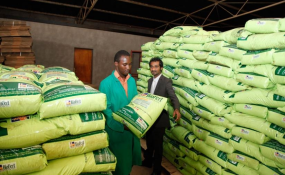Transparency, open doors needed in fertiliser business LAST week, the second Africa fertiliser agribusiness conference was conducted in Dar es Salaam.
The conference brought together over 300 international fertiliser and agribusiness executives and regional government representatives from over 45 different countries. The participants discussed among other things related to the production of fertilisers, increase trade and boost agribusiness in Tanzania and across Africa.
They also focused on the role of fertilisers within Africa agribusiness and how African agricultural industry can work with international partners to strengthen and improve its agricultural output.
The conference was conducted in Dar es Salaam at a time when many African countries, including Tanzania, face various challenges in practicing agriculture. Lack of fertilisers among African farmers and poor application of the product are among many challenges that face the sector.
Also high price for agriculture is another big obstacle that hinders agricultural development in most of African countries and in particular Tanzania. Failure to use fertilisers as required has been leading to poor crop production and thus hunger outbreak in some countries.
AFAP Vice-President Mr Richard Mkandawile told participants that the challenge of food production in Africa is a clarion call for coordinated efforts to transform African agriculture and hence accelerate the continent’s economic growth.
It’s obvious that with high agriculture production, it is obvious more jobs will be secured and livelihood will be improved. However, to boost agriculture production, African countries, including Tanzania, need to plug its soil nutrient deficit through holistic approach to increase fertiliser supply and use to enhance household and national food production.
In that matter, fertilisers play a critical role in securing better productivity for African farmers but in combination with other inputs such as better seeds and agronomic practices.
Earlier, the Minister for Agriculture, Livestock and Fisheries, Dr Charles Tizeba, called upon all fertiliser producers and dealers to lower fertilisers’ prices so that majority Tanzanians could manage to apply it in agriculture production.
He said fertiliser production cost has gone down across the world but still it is being purchased at higher prices in the country. As Dr Tizeba pointed out that the global fertiliser price is going down, the same thing must happen in Tanzania so that local farmers could benefit.
However, one tonne of fertiliser is transported from Egypt to Dar es Salaam at a cost of 30 US dollars. As of last year, the records show that one tonne of tobacco fertiliser reach Dar es Salaam port at a cost of 240 US dollars.
The same one tone of fertiliser costs 70US dollars to take it to Tabora Region, but shockingly, traders sold one tone of tobacco fertiliser at 1,050 US dollars in Tabora Region last year.
The minister declared the government’s commitment in making sure fertiliser prices are harmonised so that majority farmers could apply it in farming. He said the government is investigating who is behind the ‘dirty game’.
According to Dr Tizeba, several strategies are underway to reduce fertiliser prices by 20 per cent in the next farming season. “We have a very big problem in this business, some few people are stealing from farmers and the government, we are therefore investigating this matter,” he said.
Apart from all those challenges, statistics show that the government has played a big role to ensure farmers are using fertilisers as required. Using subsidiary scheme, the government has indeed increased fertiliser use from 8kg/ha in 2006/2007 to 19.3kg/ha in 2012/2013.
However, the country’s total fertiliser consumption is still far below the Abuja Declaration target at 19.3 of fertiliser per hectare, this means, there must be more push more to boost productivity.
With this situation, there is need for both local and foreign investors to focus on investing in agriculture sector by establishing fertiliser plants across the country. Dr Tizeba said so far, three big fertiliser plants are being constructed in the country.
However, for reliable production and supply of fertilisers to farmers in the country, there is need for the government to ensure transparency and open doors for investors to bring competition in the business.
Source: Tanzania Daily News/Florence Mugarula



